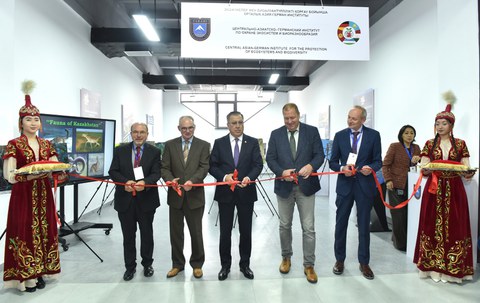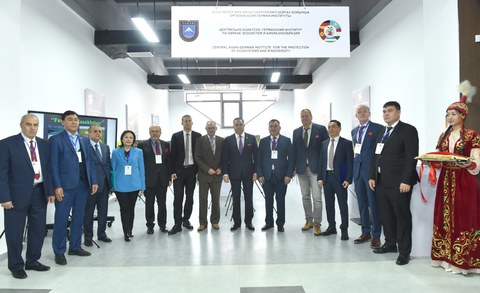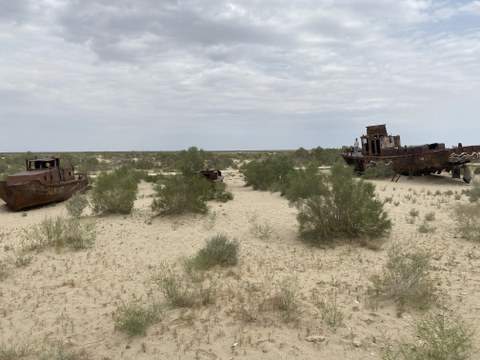Nov 07, 2025
New virtual research center in Central Asia for the protection of ecosystems and biodiversity with TUD participation

Inauguration of CAGEB: Karl-Heinz Feger, TUD; Matthias Kramer, NETSCI; Zhanseit Tuimebayev, Al-Farabi National University; Hendryk Flachowski, JKI Institute Pillnitz; Ulrich Pietzarka, Forest Botanical Garden and Saxon State Arboretum Tharandt
The "Central Asian-German Institute for the Protection of Ecosystems and Biodiversity - CAGEB" has been established at the Kazakh National University Al-Farabi in Almaty. Senior Professor Karl-Heinz Feger (Faculty of Environmental Sciences) and Dr. Ulrich Pietzarka, Curator of the Forest Park Tharandt, two representatives of TUD Dresden University of Technology were also involved in the opening ceremony on November 6.
The establishment of the virtual center was preceded by several preparatory meetings, most recently in May in Dushambe (Tajikistan) and Nukus (Uzbekistan) - also with TUD participation. CAGEB was initiated by the emeritus environmental economist Prof. Matthias Kramer, formerly of the International Institute (IHI) Zittau at TU Dresden and former Rector of the German-Kazakh University of Almaty. He also acts as coordinator within the framework of NETSCI (NETwork for System Competence and Innovation). The basic activities were funded by the Federal Ministry of Research, Technology and Space (BMFTR) and the German Federal Environmental Foundation (DBU).

Scientific and political representatives from several Central Asian countries and Germany were present.
The new center, which is based at the renowned Al-Farabi University in Almaty, initially serves the exchange of experience and cross-border networking. However, the main objective is to further develop CAGEB into the leading platform for cooperation in environmental research between scientists from the Central Asian countries and Germany. On the German side, the Leibniz Institute of Agricultural Development in Transition Economies (IAMO) in Halle and the Julius Kühn Federal Research Institute for Cultivated Plants (JKI) with its Institute for Breeding Research on Fruit in Pillnitz are involved in addition to the TUD Environmental Sciences.
Central Asia has a unique diversity of fauna and flora in very different natural areas, ranging from high mountains to vast grassland steppes and deserts. The region is considered to be the most severely affected by climate change worldwide. At the same time, however, inappropriate land use has led to the degradation of ecosystems and loss of natural resources, such as in the Aral Sea region. Extreme water shortages and soil erosion and salinization are increasingly threatening the richness of ecosystems and biodiversity. Increased international efforts in interdisciplinary and transdisciplinary research are therefore required to ensure sustainability for future generations.
The increasing drying up of the Aral Sea is considered one of the world's biggest man-made environmental disasters. It is caused by climate change and the intensification of agricultural irrigation in the catchment area, which covers most of Central Asia. The surface area of the Aral Sea, which was the fourth largest lake in the world until the early 1960s, is now only around 10% of its original size. At the same time, the salinity has quadrupled, leading to the loss of fish stocks. The new saline soils created from the lake bed are exposed to wind erosion, which also affects the vegetation in more distant areas.
Further information:
Institute for Biodiversity Conservation opened in KazNU
Contact:
Prof. Karl-Heinz Feger
Institute of Soil Science and Site Ecology
Tel. +49 351 463-31307
Email:

